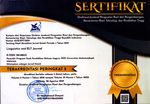A Socio-Pragmatics Approach of Refusal Strategies on a Biopic Movie “Sang Pencerah (The Enlightener)”
Abstract
Refusal isnegative responses to request, invitations, suggestions, offers, and the like which are frequently used in our daily lives (Sadler & Eroz, 2001: 55). Refusing is not just directly by saying no, but it can be an indirect utterance by giving additional explanation or reason, statement of regret, etc.However, the researcher want to analyse the context of Sang Pencerah an Indonesian national heroine from Kauman, Yogyakartascript which is a biopic moviein sociolinguistics perspectives based on socio-pragmatics approach.Sang Pencerah(The Enlightener) is a 2010 Indonesian film is a biopicof Ahmad Dahlanwhich describes how he came to found the Islamic organisation Muhammadiyah.The subject of the study is the script itself with two problem statements, they are; doesindirect refusal strategies classifications are used by the characters in the movie in their conversation, and what indicated of it is applied. To investigate of the problemsanswer, the researcherapplies a theory of refusal strategies from Bebee, Takahashi, and Uliss-Weltz’s(1998). Hence, the researcher used a descriptive qualitative method in analyzing this researchby using the Miles and Huberman theory. In doing the analysis, the researcher found about indirect refusal strategies and the indicated of it is applied by the characters in the conversation of Sang Pencerah script movie. There are conversations using indirect refusal strategies and the types used by the characters in the conversation of the Sang Pencerah conversation script movie are
Keywords
Full Text:
PDFReferences
Ajisaka, Arya: Damayanti, Dewi. (2010). Knowing Indonesian Heroes (in Indonesia). Jakarta : Kawan Pustaka.
Amerien, Novy. “Interlanguage Pragmatics: A Study of the Refusal Strategies of Indonesian Speakers Speaking English”. Malang: Politeknik Unibraw, Malang.
Arikunto, Suharsimi. (2013). Prosedur Penelitian. Jakarta: Rineka cipta.
Beebe, L., Takahashi, T., & Uliss-Weltz, R. 1990. Pragmatic Transfer in ESL refusal. Developing communicative competence in second language (pp. 55-73). New York: Newbury House.
Brown, P. & Levinson, S.C. (1987). Politeness: Some Universals in Language Usage. Cambridge: Cambridge University Press.
Coulthard, M. 1985. An Introduction to discourse analysis. Longman: London and New York.
Dey, Ian. (2005). Qualitative Data Analysis. New York: Routledge press Ltd
Holmes, Janet. (2001). An Introduction to Sociolinguistics Second Edition. England: Longman Group.
Levinson, S.C. (1983). Pragmatics. Cambridge: Cambridge University
Leech, G. (1983). Principles of Pragmatics. London: Longman.
Komandoko, Gamal. (2006). Stories 9f 124 Indonesian Heroes (in Indonesia). Sleman : Pustaka Widyatama
Sang Pencerah, “Going Against in the Flow, Empowerin Women”. Republika (in Indonesia). Jakarta. 29 September 2008. Archived from the original on 14 January 2012. Retrieved 14 January 2012.
Schmidt, Richard, and Richards Jack. C. “Speech Acts and Second Language Learning. “Applied Linguistis ½. London and New York.
Wahyudi, Jarot. (2002). ”Sang Pencerah:Mover of Muhammadiyah Women) in Burhanudin, Jajat. Indonesian Women Ulamas (in Indonesia). Jakarta:Gramedia.
DOI: https://doi.org/10.31764/leltj.v8i1.1064
Refbacks
- There are currently no refbacks.
Copyright (c) 2020 Linguistics and English Language Teaching Journal

This work is licensed under a Creative Commons Attribution-ShareAlike 4.0 International License.
_____________________________________________________
Linguistics and ELT Journal
p-ISSN 2339-2940 | e-ISSN 2614-8633

LELTJ is licensed under a Creative Commons Attribution-ShareAlike 4.0 International License.
_____________________________________________________
LELTJ is abstracting & indexing in the following databases:
_____________________________________________________
LELTJ Editorial Office:













